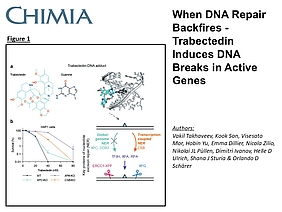New publication by the Ulrich lab: When DNA Repair Backfires - Trabectedin Induces DNA Breaks in Active Genes.
Takhaveev V, Son K, Mor V, Yu H, Dillier E, Zilo N, Püllen NJL, Ivanov D, Ulrich HD, Sturia SJ, Schärer OD (2025) When DNA Repair Backfires - Trabectedin Induces DNA Breaks in Active Genes. Chimia, doi: 10.2533/chimia.2025.237 Link
Abstract:
Many anticancer drugs are ineffective in tumors that have functional DNA repair mechanisms. In con-trast, trabectedin, a tetrahydroisoquinoline alkaloid marine natural product, stands out as it is more lethal to can-cer cells with active DNA repair, particularly transcription-coupled nucleotide excision repair (TC-NER), making it an intriguing alternative to standard chemotherapeutic agents. To optimize trabectedin’s use in precision onco-logy, it is essential to understand how its toxicity depends on TC-NER. In this study, we reveal that incomplete TC-NER of trabectedin-DNA adducts generates persistent single-strand breaks (SSBs). These adducts are found to obstruct the second of two sequential NER-mediated DNA incisions. By mapping the 3'-hydroxyl groups of SSBs resulting from the first NER incision at trabectedin-DNA adducts, we achieve genome-wide visualization of TC-NER. Our findings show that trabectedin-induced SSBs predominantly occur in the transcribed strands of active genes, accumulating near transcription start sites. This work provides new insights into how trabectedin can be leveraged for targeted cancer therapies and for studying TC-NER and transcription.
Read the full paper here: https://www.chimia.ch/chimia/article/view/2025_237/2025_237

